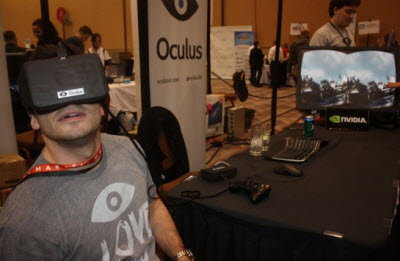 GamesBeat: What are some things that seem like they’re in a hype cycle to you?
GamesBeat: What are some things that seem like they’re in a hype cycle to you?
Schell: Google Glass. There’s inflated expectations about the potential of Google Glass. None of us know how that’s going to go down. As you and I know, no matter how good it is when it comes out, everyone will be disappointed. [Laughs] The Oculus Rift.
GamesBeat: Virtual reality?
Schell: Yeah. People are expecting that to be the second coming. It sounds like a good helmet, but helmets have their problems. We’re all going to face that. Oh, another one that’s getting a lot of hype right now is the Leap Motion. It’s a fingertip tracker. It’s about the size of an iPhone. You can put your hands in the space above it, and it can very accurately track your fingertips. A lot of people who haven’t tried it feel like, “Now it can be Tom Cruise in Minority Report.” We haven’t gotten to a hype cycle for Xbox 361 or whatever they’re calling yet, or the PS4, but that’ll be coming soon.
GamesBeat: In all of the platform wars going on right now, what do you think is going to happen? The iPad was a surprise to everybody, but does it eat everybody else?
Schell: Technologies always diverge. We know that. There are a few technologies coming into play at once, which will make the console wars hard to predict. Of the key technologies that I think will make the difference, number one is going to be the tablet. The tablet is going to fuse with the console in some way we don’t understand yet. The Wii U is an interesting first step, but the tablet can’t leave the living room. That’s not really a tablet. People don’t take that seriously as a tablet. It’s just a novel game controller. But someone’s going to make one that can leave.
The other part of it is, someone’s going to do a good job of fusing thumbsticks with the tablet. That’s sorely lacking right now because as magical as touch-screen interfaces can be, they are not good for navigating three-dimensional spaces. People have tried dozens of experiments, and there are some methods that are okay, but there are none that are great. Every single one of them feels like a less fulfilling version of the thumbstick. Someone is going to crack that nut. If they’re going to do that, they’re probably going to find a way to bridge between the TV and the tablet. Who it’s going to be, I don’t know, but that’s an important piece.
I also think cloud gaming is going to sneak up on everybody and upset the market. But who is it going to come from? Is it going to come from Sony because they bought Gaikai? Is it going to come from Apple because they have Apple TV in place? Is it going to be some dark horse that shows up and makes a deal with the cable companies, and suddenly everyone with Comcast has an awesome cloud gaming system? I don’t know.
The third part of that is, new devices may upset the market a little bit. Microsoft or Nintendo could cook up some crazy new thing for the living room that we didn’t see. That could tip things around.
 GamesBeat: Do you think that a more accurate Kinect or a gestural system would have a future?
GamesBeat: Do you think that a more accurate Kinect or a gestural system would have a future?
Schell: These systems will have a future because people like to dance. But what we haven’t seen yet is anyone successfully using motion control to redefine a genre. New genres, sure. Dance games are a new genre. But you have not heard anyone say, “Wow, this is like Zelda,but better because it has motion.” We don’t have that yet. It’s a big question. Can we get there, or is motion more of a novelty that allows for new genres? If someone can do that, that’ll be a big deal because the important thing with the motion-sensing systems is that they’re not portable. They’re not going to be good for the PC. They’re going to want to be in the living room.
Eye tracking is going to sneak up on everybody. We’ve been using the LC Technologies EyeFollower at the school. I don’t know if you’ve seen that thing. It’s mind-blowing.
GamesBeat: I saw one thing, a demo that Intel showed at [the Consumer Electronics Show]. It was a Where’s Waldo game that would track your eye and tell you if you hit Waldo or not.
Schell: Yeah. We’ve had eye-tracking technology for a long time, but it’s always been kind of flaky. It doesn’t always work that well. The EyeFollower is a mind-blowing piece of technology. You can be doing the Kinect, and this thing tracks your eyes at the same time. We started making games with it at the school. I wasn’t quite sure at first — maybe it was going to just feel awkward trying to play games with your eyes.
We control our eyes much more unconsciously than we control the other parts of our body. More so than we control our hands. Our hands can be a little bit unconscious, but our eyes are just naturally, unconsciously controlled. When you get the game right, it feels like you’re just thinking about what to do, and the character in the game does it. It’s a great feeling.
I think the eye tracking is going to have implications for games and for user interface in general. My simple envelope math says that by the year 2020, or somewhere between 2020 and 2025, devices like tablets are going to have a high enough camera resolution that they can do good enough eye tracking and that can be part of your interface. That’s going to be a magical interface. I talked about magical interfaces in my talk yesterday. I think that will be a magical one. It’s going to revolutionize games and interfaces in general.
GamesBeat: The Google Glass people have observed that your eye is much more accurate at hitting targets than, say, your hand.
Schell: Oh, yeah. Your eye can track a target that’s just moving around. We have brain hardware that’s all about tracking targets. If you’re in a moving car and you look out the window, it’s very hard to keep your eyes still. Your eyes are grabbing everything because that’s what they do. They grab and lock.
For new interfaces to take over old genres, they have to be better than what you had before. So far, most of the new motion interfaces aren’t better. They don’t let me shoot better or move faster or be more accurate or put out less effort. Eye tracking could do a lot of those things.
